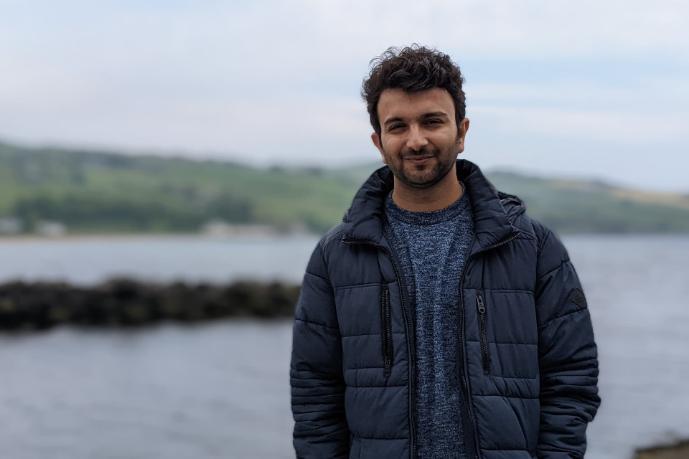Meet Dr Hemant Khatri
Dr Hemant Khatri is a Postdoctoral Research Associate in the Department of Earth, Ocean and Ecological Sciences, exploring how ocean dynamics influence climate variability and long-term predictability.
- Name – Dr Hemant Khatri
- Position – Postdoctoral Research Associate, Department of Earth, Ocean and Ecological Sciences
- Group Name – Ocean Science
- Joined University of Liverpool – 2021
- Born – Rajasthan, India
- PhD – Imperial College London, UK

What is your research about?
My research focuses on the ocean's role in the climate system. Oceans regulate global temperatures by storing excess heat and carbon due to increasing greenhouse gases. I am interested in questions related to climate change and variability, meridional overturning circulation and small-scale turbulent processes in the ocean. I use a combination of theoretical frameworks, idealised process models, climate model outputs and observations in my research.
My research philosophy is to simplify analyses of various processes to improve our understanding of the complexities involved in the climate system. In the process, I develop simple mathematical frameworks to study ocean dynamics and interpret the underlying physics using theoretical concepts in fluid mechanics and ocean physics.
What or who first inspired you to be interested in your research subject?
My first experience with climate science was during a semester-long thesis in my undergraduate degree in chemical engineering. I worked on a research project understanding how clouds form in the atmosphere and how water droplets grow on tiny aerosol particles.
I loved working on this project. While doing so, I learnt about how the atmosphere and ocean work together to regular Earth’s climate. I realised that I could easily apply my skills from my engineering and mathematics training. I then decided to apply for a PhD and pursue a career in climate research.
What are you most proud of achieving during your research career so far?
Through my research at Liverpool, I developed a novel method to precisely calculate ocean memory. This method allows us to estimate how long the ocean can remember information, such as changes in its temperature or currents caused by an external impact. In the literature, ocean memory isn't clearly defined, and my research provides a precise definition. It is crucial to analyse ocean memory to improve the ocean state simulation in climate models and to evaluate their skills in year-to-year climate predictability.
What techniques and equipment do you use to conduct your research?
My research is mostly theoretical and computational. I work with simplified mathematical models of ocean and climate. I develop computer codes using python and MATLAB for climate data analysis. I also run climate model simulations.
Which other subjects are important for your research?
My focus is on the physics of oceans and climate, which requires a good foundation in physics, mathematics and fluid mechanics. In addition, experience with computer coding languages is useful for working with climate model outputs, which often range in size between gigabytes and terabytes.
What is the key to running a successful research group?
What I appreciate most is the research independence within a group. My advisors have always supported me in pursuing new research directions and ideas, which has led me to develop my own projects and build new collaborations. In my future research team, I want to build an environment that welcomes new research ideas from everyone and provides support to pursue them. I believe that developing an equal opportunity and diverse environment is the most important aspect for the success of every member and the whole research team.
What impact is your research having outside of academia?
Given the theoretical nature of my research, its immediate impact outside of academia is somewhat limited. However, there is a potential long-term application of my ocean memory approach for developing advanced statistical methods to generate improved regional climate forecasts for up to a decade. These forecasts can be used by government agencies and private industry, such as in the energy and insurance sectors, to estimate climate risk in the coming years.
How do you plan to develop your research in the future?
My long-term goal is to develop theoretical frameworks and modelling tools that explain the roles of different physical processes and phenomena in the ocean in the changing climate. I aim to establish my research group to address emerging questions in climate variability and predictability.
What problem would you like to solve in the next 10 years through your research?
We have decent weather forecasts and century-long projections, but we lack reliable decadal climate forecasts and understanding of regional climate variability. Through my research, I aim to contribute to improving the representation of ocean processes and associated timescales in climate models. This will enhance decadal climate prediction skills, bridging the gap between seasonal forecasts and century-long climate change projections.
What advice would you give to someone considering a career in research?
One needs to be open to new challenges every day and to be self-motivated for a career in research. What I enjoy most in research is doing what I enjoy and not doing the same tasks every day. The main thing I learned in research is that one needs to know when to let go. Research involves developing new ideas, many of which fail, and relatively few work. We need to focus on things that work and not worry about negative results. If we are persistent, research can be an extremely rewarding career.
Where can readers learn more about your research?
You can find more about my research on my personal website: https://hmkhatri.github.io.
My ocean memory research was also featured in a University news story: https://news.liverpool.ac.uk/2024/12/03/researchers-find-north-atlantic-ocean-has-nearly-two-decades-memory/
I developed a novel method to estimate how long the ocean can remember information, such as changes in its temperature or currents caused by an external impact.